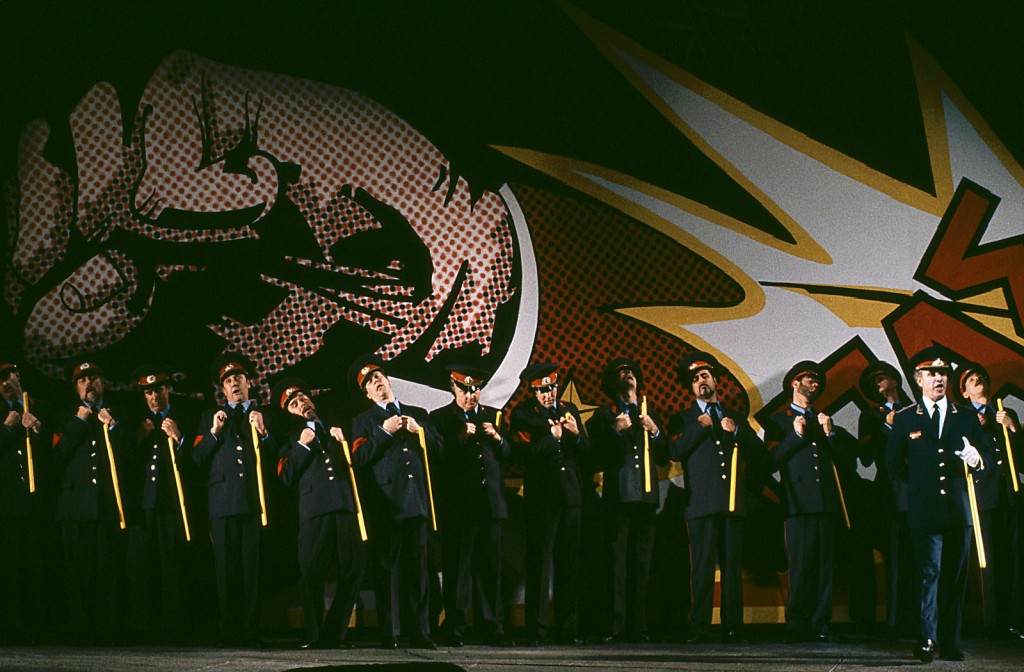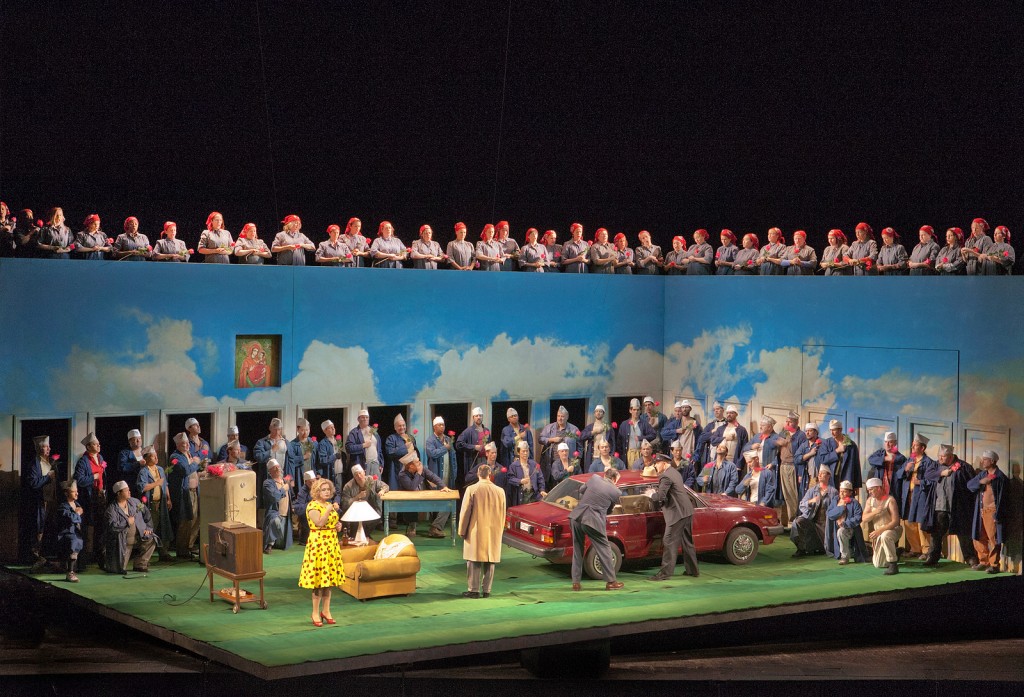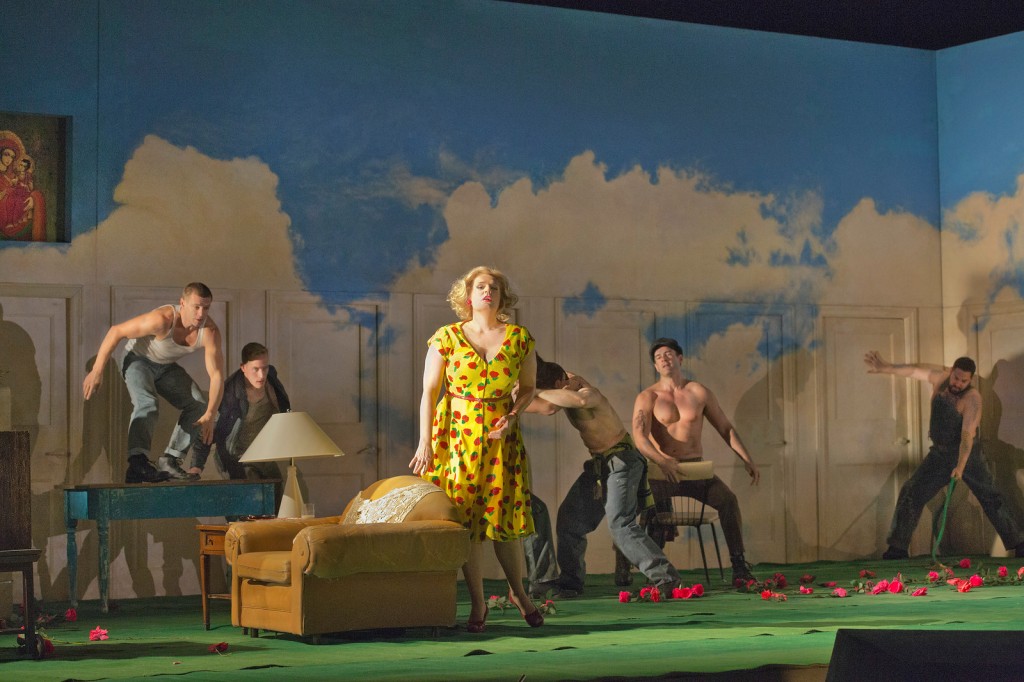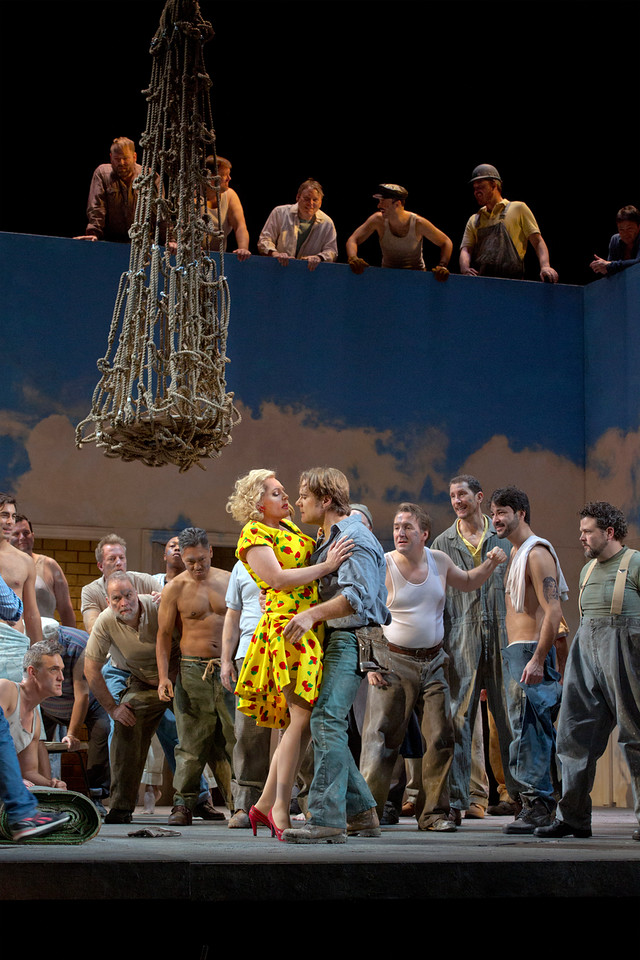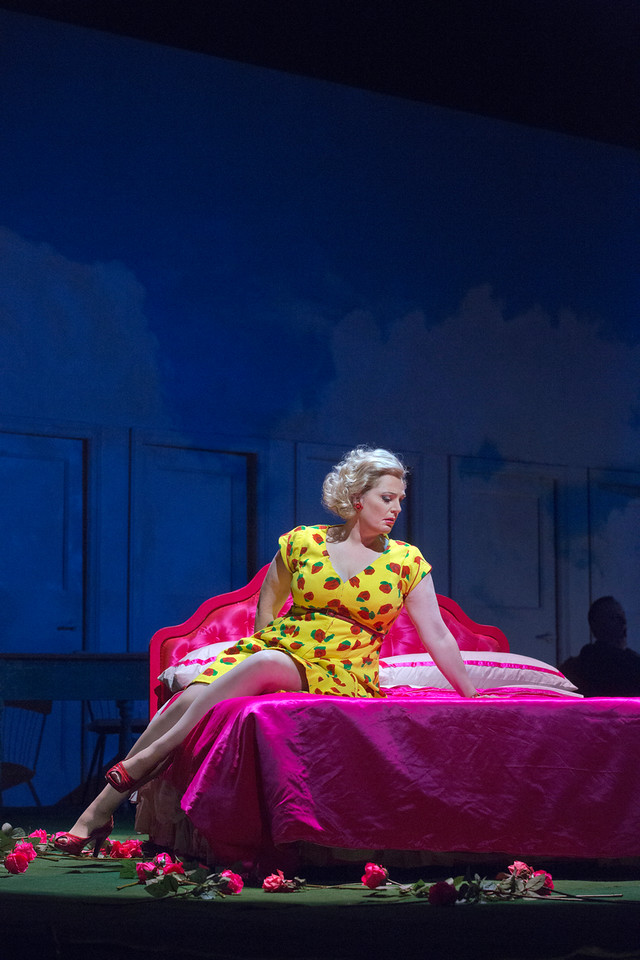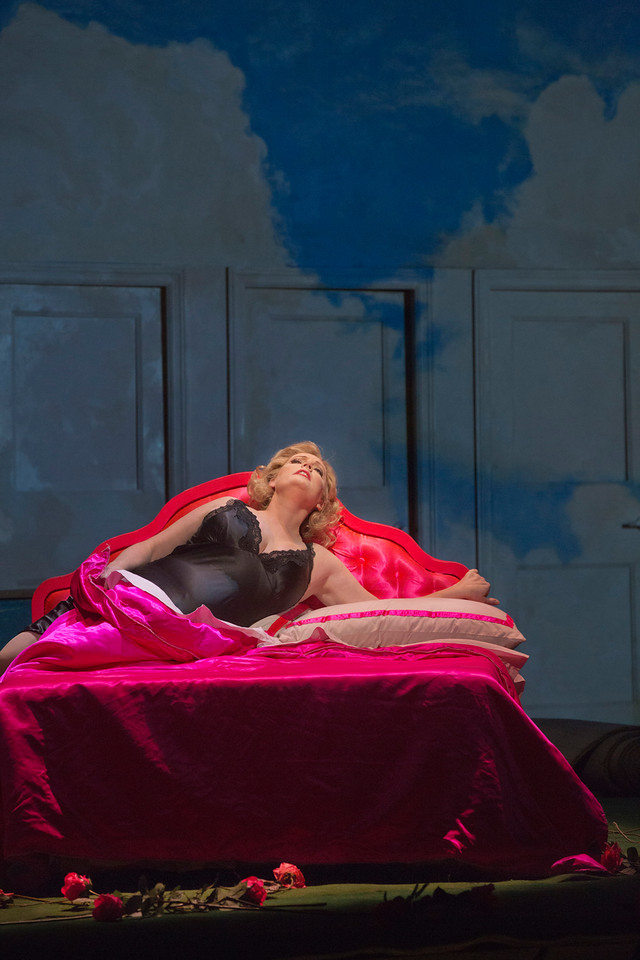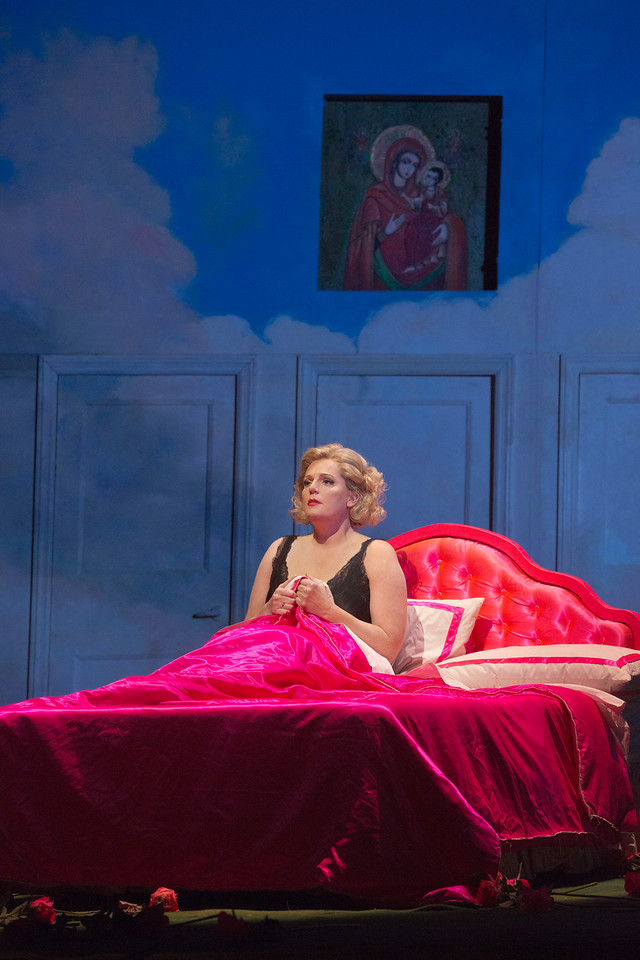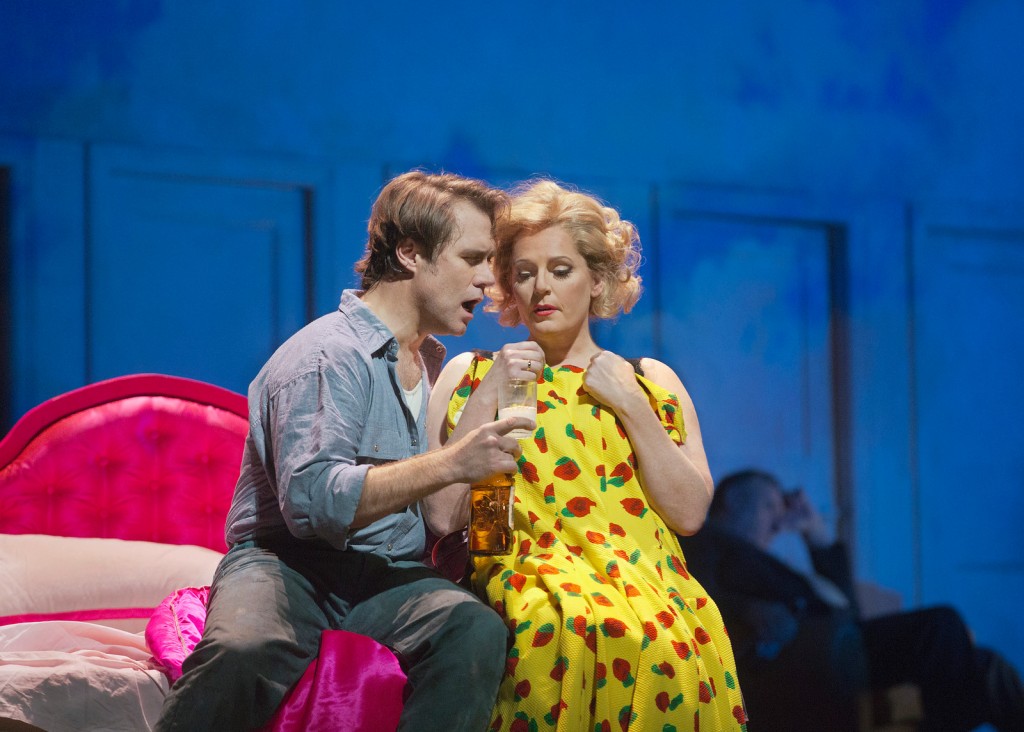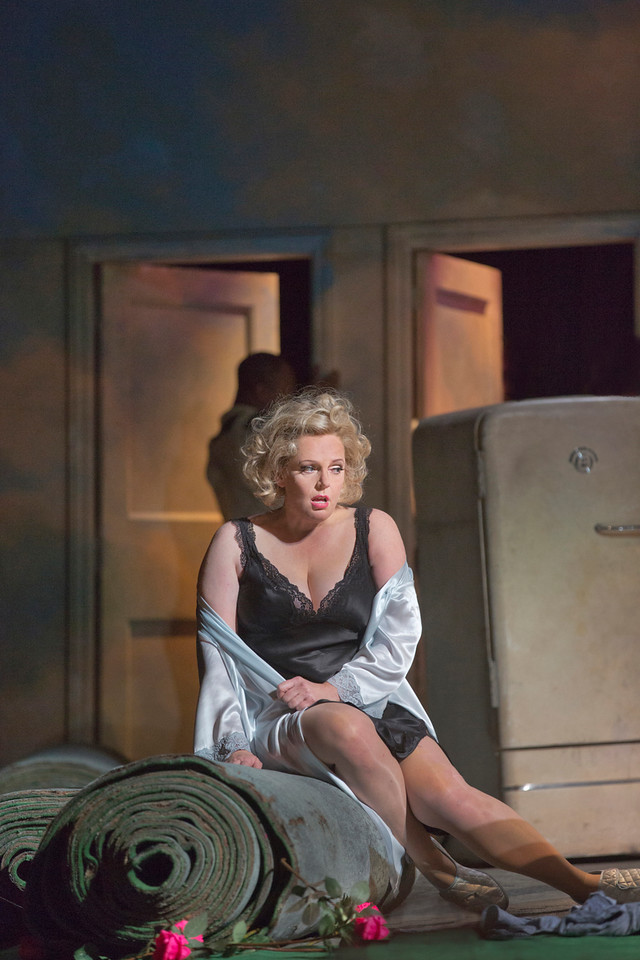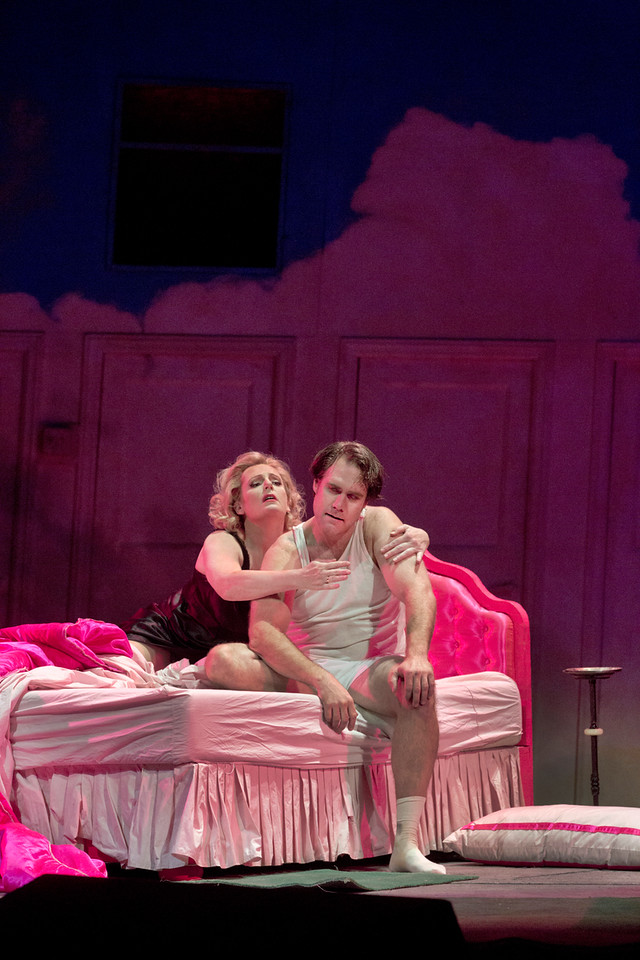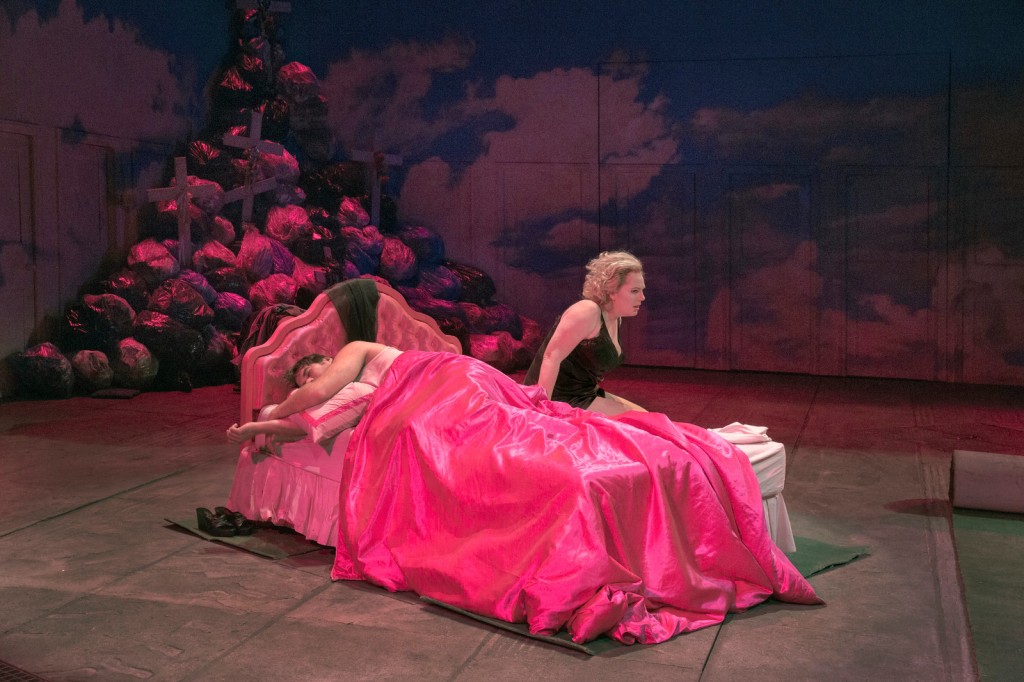- REPORT | Ukrainian Pianist Crowned Winner Of 2022 Honens Competition - October 29, 2022
- REPORT | The 10th Honens International Piano Competition: Finals I - October 28, 2022
- REPORT | The 10th Honens International Piano Competition: Semifinals IX-X - October 25, 2022
Shostakovich’s Lady Macbeth of Mtsensk. The Metropolitan Opera, NYC. 10 November, 2014.
It is a mystery why Shostakovich’s Lady Macbeth of Mtsensk is performed so rarely. This wild opera was written in 1932 and it only premiered at the Met in 1994 with a production by Graham Vick that returned last Monday. The production remains silly, the opera magnificent.
The superb cast stars Eva-Maria Westbroek as a captivating and indefatigable Ledi, Katerina Ismailova. We meet her dozing in front of a TV, and when she gets up to look for something to do in the fridge, it is with a petulant wiggle. Anatoli Kotscherga is preposterously menacing as her leering father-in-law Boris; vulgarity pokes out of him like hair, and if I don’t especially recall Brandon Jovanovich’s Sergei or Raymond Very’s Vinovy, it must be because the first two were so good. Some supporting singers stood out, like Vladimir Ognovenko, who was almost too beautiful as the Police Sargeant, Dmitry Belosselskiy as a kind old convict, and Oksana Volkova as the purring Sonetka.
It’s worth dealing with US Customs—”Opera? Ooh.” He said, and spat on the floor—just to hear this Ledi, which continues through November 29, but it’s ironic that the opera is difficult to see (the COC last performed it in 2007) since its incredible popularity was part of the reason the Soviets banned it from 1936 until 1961. It’s a well-known story: Shostakovich and librettist Alexander Preis write an opera based on Nikolai Leskov’s famous story of 1865, itself based on real events of a provincial murderess; the opera premieres in 1934, is performed nearly 200 times in the USSR, and becomes an international sensation before Stalin sees it in Moscow in 1936 and walks out. Two days later, an editorial in Pravda attacks Shostakovich for musical inaccessibility and—more bizarrely—misreads Katerina’s murders as motivated by the greed of a “bourgeois huntress”.
This is weird. It’s actually an easier charge to level at Leskov’s story, which is definitely pre-revolutionary and includes the horrific murder of a child who threatens Katerina’s claim to her husband’s property. Shostakovich and Pries cut this murder, number three, because it is hard to sympathize with a woman who suffocates a nine-year old with a pillow between her breasts. In the opera, she is just lonely and horny; nothing suggests she cares about money.
She is not, however, passive. Katerina poisons her father in law and strangles her husband when they get in the way of her relationship with one of their workers, Sergei. But she does not initiate the affair. Sergei’s idea of an icebreaker is standing around thrusting, and this mute Elvis only opens his mouth after Katerina interrupts a gang rape, and then only to mock her. When he comes to her that night, uninvited, she resists him. Shostakovich cut her most sexually charged aria, “The Foal Runs After The Filly” before Sergei’s arrival, perhaps to make his advances appear less welcome. This production restores it, but their encounter continues in the key of sexual aggression anyway. Then she takes the lead in violence for a while.
So, as Rostropovich put it, “is she a swine or not a swine?”
This ambiguity needs careful tending or it collapses in the opera’s satirical abundance. Shostakovich’s music mocks all the characters except Katerina, who has the only earnest, folksy arias. Until Ledi, Shostakovich’s stage works were grotesques modelled on Gogol, an “industrial ballet” called The Bolt, another about a football team, Golden Age, and finally The Nose, actually based on Gogol’s story. Lady Macbeth isn’t as jagged as The Nose, but it’s still carried by the manic vitality of the music rather than by dramatic consistency.
Ledi was intended to be a very Soviet critique of pre-revolutionary culture, focused on the life of women. Shostakovich wrote that “I want to write a Soviet Ring. The first operatic tetralogy about women, of which Lady Macbeth will be the Rheingold. This will be followed by an opera around the heroine of the People’s Will Movement [the assassins of Alexander II]. Then a woman of our century; and finally I will create our Soviet heroine, who will combine in her character the qualities of the woman of today and tomorrow.”
This project was probably incompatible with official Soviet culture before 1934—it’s not coincidental that Stalin banned non-therapeutic abortions the same year he banned Ledi. Mores were changing, and he would change them even more. World war and a civil war increased the number of orphaned and abandoned children to about 7 million by 1921; the divorce rate tripled in the USSR between 1924 and 1927; and the arc of revolutionary attitudes towards sex can be traced in the career of Central-Committee member and feminist Alexandra Kollontai, who struggled against reactionaries including a “Marxist Psychoneurologist” called Zalkand and his “Twelve Commandments” against things like sexual activity before twenty-five, attraction to a class enemy, and too-frequent sex. (This paragraph and more brought to you by Elizabeth A. Well’s fascinating article.)
The Pravda editorial made it clear that sexual politics were a big part of the problem. “The composer has tried, with all the musical and dramatic means at his command, to arouse the sympathy of the spectators for the coarse and vulgar inclinations and behaviour of the merchant woman Katerina Ismailova.” But Vick’s production is too cartoonish to sustain the sympathy, and it seems to mock Shostakovich as he makes fun of his cretinous characters. This risks turning the opera into a farce—a game that can end very badly.
Visual clichés from Socialist Realism to Surrealism and Pop are thrown together in a 50s setting that could be the USSR or the United States. Later imagery and costumes suggest the former, but it doesn’t seem to matter much. Scene changes are inexplicably sexed up with workers showering and brides fondling vacuum cleaners; police strip to reveal superhero underwear; Katerina and Sergei’s wedding becomes a pornorama. None of this is totally alien to the music, which includes circus motifs and plenty of obscene noises, but the exaggeration is artless.
The latrine hurts most of all. Like Chekhov’s gun on the mantlepiece, a pit latrine is onstage for a long time before Katerina hides there to snatch Sonetka—Sergei’s new prison lover—by the heel and drown them both. This degradation buries her as a slave to her needs for sex and love, but Shostakovich intended an ending after Leskov, who wrote admiringly that Katerina tackles Sonetka overboard like “a strong pike on a soft-finned little roach”. This ambiguity is central to the opera and should be restored.
The production has its strengths, too, beyond the astonishing vocal talent. In an early scene, Boris orders to Katerina to bed, and he remains onstage watching TV and swilling beer while she sings suggestively about her loneliness. He’s ‘the man’ nearby, and this visual replacement of son by father reinforces Boris’ unpleasantly sexual role in the opera. At one point he sings about what he’d do to Katerina if he were younger. Then there’s the terrifying three-story rose that rises behind the set like a nuclear cloud when Sergei first visits Katerina. It’s so big that they literally couple in its shadow, a distraction that increases the shock of the famous ejaculatory trombones.
Conlon worked the pit with laid back finesse and produced a performance that sounded much more sophisticated than it looked. But productions come and go, and Ledi will always be a tragedy if you know her story. There are few works that so ferociously convey an individual spirit and leave you mourning, not for Katerina, but for the operas Shostakovich never wrote.
- REPORT | Ukrainian Pianist Crowned Winner Of 2022 Honens Competition - October 29, 2022
- REPORT | The 10th Honens International Piano Competition: Finals I - October 28, 2022
- REPORT | The 10th Honens International Piano Competition: Semifinals IX-X - October 25, 2022

